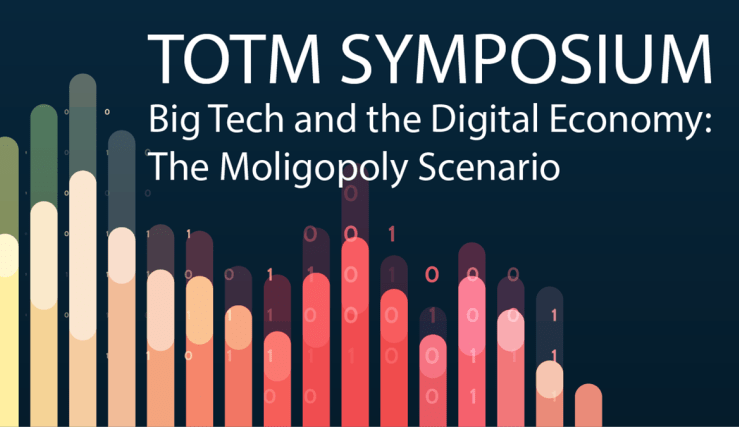Showing results for: “digital markets act”
Mandatory Interoperability Is Not a ‘Super Tool’ for Platform Competition
On both sides of the Atlantic, 2021 has seen legislative and regulatory proposals to mandate that various digital services be made interoperable with others. Several bills to do so have been proposed in Congress; the EU’s proposed Digital Markets Act would mandate interoperability in certain contexts for “gatekeeper” platforms; and the UK’s competition regulator will ... Mandatory Interoperability Is Not a ‘Super Tool’ for Platform Competition
Antitrust Statutorification
A lot of water has gone under the bridge since my book was published last year. To close this symposium, I thought I would discuss the new phase of antirust statutorification taking place before our eyes. In the United States, Congress is working on five antitrust bills that propose to subject platforms to stringent obligations, ... Antitrust Statutorification
The Contestable Platform Paradox
Why do digital industries routinely lead to one company having a very large share of the market (at least if one defines markets narrowly)? To anyone familiar with competition policy discussions, the answer might seem obvious: network effects, scale-related economies, and other barriers to entry lead to winner-take-all dynamics in platform industries. Accordingly, it is ... The Contestable Platform Paradox
Gatekeeping, the DMA, and the Future of Competition Regulation
The European Commission late last month published the full list of its “gatekeeper” designations under the Digital Markets Act (DMA). Alphabet, Amazon, Apple, ByteDance, Meta, and Microsoft—the six designated gatekeepers—now have six months to comply with the DMA’s list of obligations and restrictions with respect to their core platform services (CPS), or they stand to ... Gatekeeping, the DMA, and the Future of Competition Regulation
Your Definitive End-of-Year Global Tech Regulation Wrap-Up: Who’s Doing What, Where, and What to Make of It
As 2023 draws to a close, we wanted to reflect on a year that saw jurisdictions around the world proposing, debating, and (occasionally) enacting digital regulations. Some of these initiatives amended existing ex-post competition laws. Others were more ambitious, contemplating entirely new regulatory regimes from the ground up. With everything going on, it can be ... Your Definitive End-of-Year Global Tech Regulation Wrap-Up: Who’s Doing What, Where, and What to Make of It
“You don’t get to be the umpire and have a team”: should we regulate the activities of digital platforms in neighboring markets?
This guest post is by Patrick Todd, an England-qualified solicitor and author on competition law/policy in digital markets. The above quote is not about Democrat-nominee hopeful Elizabeth Warren’s policy views on sport. It is in fact an analogy to her proposal of splitting Google, Amazon, Facebook and Apple (“GAFA”) apart from their respective ancillary lines ... “You don’t get to be the umpire and have a team”: should we regulate the activities of digital platforms in neighboring markets?
Professor Carrier’s Response
First of all, I would like to express my deepest gratitude to Josh Wright. Only because of Josh’s creativity and tireless, flawless execution did this blog symposium come about and run so smoothly. I also would like to thank Dennis Crouch, who has generously cross-posted the symposium at PatentlyO. And I am grateful for the ... Professor Carrier’s Response
UMC Rulemaking After Magnuson-Moss: A Textualist Approach
Introduction The Federal Trade Commission’s (FTC) ability to conduct substantive rulemaking under both its “unfair methods of competition” (UMC) and “unfair and deceptive practices” (UDAP) mandates was upheld by the U.S. Court of Appeals for the D.C. Circuit in 1973’s National Petroleum Refiners Association v. FTC. Nonetheless, the FTC has seldom exercised this authority with ... UMC Rulemaking After Magnuson-Moss: A Textualist Approach
Time for Congress to Consider Establishing a “SMARTER” Antitrust Merger Review Framework
On October 7, 2015, the Senate Judiciary Committee held a hearing on the “Standard Merger and Acquisition Reviews Through Equal Rules” (SMARTER) Act of 2015. As former Antitrust Modernization Commission Chair (and former Acting Assistant Attorney General for Antitrust) Deborah Garza explained in her testimony, “t]he premise of the SMARTER Act is simple: A merger ... Time for Congress to Consider Establishing a “SMARTER” Antitrust Merger Review Framework
How This Supreme Court Term Might Affect the FCC’s Digital-Discrimination Rule
The recently completed U.S. Supreme Court session appears to have upended the administrative state in some pretty fundamental ways. While Loper Bright’s overruling of Chevron attracted the most headlines and hand-wringing, Jarkesy will have far-reaching effects across both the executive and judicial branches. Even seemingly “small” matters such as Ohio v. EPA and Corner Post ... How This Supreme Court Term Might Affect the FCC’s Digital-Discrimination Rule
Revisiting the Theory and Evidence on State CPAs and FTC Act Section 5 Follow-ons
One of the most fundamental issues in the ongoing debate concerning the costs and benefits of expanded FTC Section 5 enforcement is the extent to which one must be concerned with its collateral consequences. A central claim of proponents of a broad interpretation of Section 5 coupled with its aggressive enforcement is that concerns with ... Revisiting the Theory and Evidence on State CPAs and FTC Act Section 5 Follow-ons
Judge Ginsburg: On the Proposed Digital Markets Unit and the UK’s Competition and Markets Authority
Thank you, Victoria, for the invitation to respond to Mr. Coscelli and his proposal for a legislatively founded Digital Markets Unit. Mr. Coscelli is one of the most talented, successful, and creative heads a competition agency has ever had. In the case of the DMU [ed., Digital Markets Unit], however, I think he has let ... Judge Ginsburg: On the Proposed Digital Markets Unit and the UK’s Competition and Markets Authority











